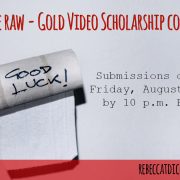Drowning in Tweets: A struggling author tries to understand Twitter
A guest post by Scott D. Southard
I dream the same dream as thousands of other people.
Yes, I am one of thousands (probably a lot more) and we are all part of the same collective consciousness, wired into the same hopes of finding writing success. And while we all know in our hearts there are not enough readers on this planet for all of us to succeed, we all keep dreaming together, sharing the same hopes, avoiding expressing the same fears.
It is all a beautifully sad thought, like a fleeting, quiet, and hopeful melody lost in a romantic symphony.
– At the time of this writing, I have 2,370 followers on Twitter –
I need to begin by blaming my brother (@AESPiano).
I had just reached more than 100 followers on my blog and he thought it was ridiculous that I had more blog followers than Twitter followers. He first reached out to his followers to find me and follow me, and then he tried to convince me to do some outreach myself, claiming that it would help my writing career.
Frankly, I didn’t see it, but I decided to do some investigating out of curiosity. I found a fellow writer who was following me and started to scroll through her followers, looking for other writers, and following the ones I felt might be interesting.
My obsession began, like a new sport being discovered. By the end of the first week, I had a 1,000 followers.
Tweet indeed.
– 2,372 –
I have to be honest here: My first reaction to experiencing the writing world around Twitter was despair. Not a surprising emotion, as you scroll through writer tweets after writer tweets, each trying to convince you to check out their book, read a sample and buy, buy, buy.
Some are outright pitches (comparing their book to other works, sales, a random positive review), some contain maybe one or two sentences to try and catch your eye (but out of context, rarely work or are trying to be too profound). There are bargain hunters (“My book is only 99 cents today!”), and others are nothing more than a title and a link. It reminds me of the last gasp of a swimmer lost at sea, about to go down for the third time.
My immediate vision was of a street of fishmongers back in Victorian times. Each of us shouting “I have the best fish,” but no customers in sight. So all we are doing is shouting at each other until we are hoarse. Not a fair comparison I know now, but it was honestly the first image I had. What can I say? I am shouting “Fresh Fish! I got the best fresh fish! Who wants a halibut?” just like everyone else.
(I have two, by the way, that are particularly tasty. They are called A Jane Austen Daydream and Maximilian Standforth and the Case of the Dangerous Dare… Sorry, force of habit).
– 2,380 –
During my first week, I did an experiment. You will see tweets with people offering services to promote books. One offered to promote my book to 50,000 people via Twitter and Facebook for only $35 or so.
I thought, “What the heck?” I did it, and considered the investment part of my education into the possibilities of Twitter.
On their Facebook page, the company used the wrong cover for my book. I kid you not. Instead of my slick 1950s sci-fi cover (this is for My Problem With Doors), they used the cover for… wait for it… The Christmas Cookie Club.
Wow.
I mean… wow.
I pointed it out , they corrected it. But what I soon realized was they were just adding my book to the “noise” of the market. And it wasn’t cutting through. Since then, I hadn’t seen anything in my numbers to justify the expense in the future.
So what is the lesson? Basically, it is not easy to cut through the congestion of Twitter. You need a unique hook that is all your own. But what that is or how it is done, everyone has to find for themselves. Personally, I am still looking.
– 2,384 –
I see Twitter different now.
Twitter, in my opinion, is the great melting pot for writers.
We are all equal here. You want to call yourself a writer or an author, feel free. Everyone is welcome.
This is all a new thing for the world of writing, an environment that has spent over a hundred years finding the right spot, right genre and right amount of success for everyone entering it. (And if you didn’t fit the mold, you didn’t play the game). On Twitter, the literary snobbery gets left at the door.
Those old rules are gone. Established writers are no different from the indie and the self-published writers. We all market ourselves and our books there, and what our numbers come down to is how aggressive we want to be to get the word out.
As a lover of literature, I can’t wait to see what the writing world looks like a decade from now because of this. Honestly, I have no idea how it will turn out and what will remain at the end of it.
– 2,386 –
One of the things I love about finding writers on Twitter is a game I made up. I call it “Guess the Genre.”
Rules: I give myself two points if I guess the genre of the writer correctly before I look at their bio. I take away one point if I guess incorrectly.
To be honest, I am usually correct. For example:
- Horror/Paranormal writers are in the shadows, trying to look scary.
- Romance writers usually have covers of their books, and each looks like something from a harlequin shelf. There is a fascination with abs. How the heroes have time to woo with all of the work needed to keep those abs up to snuff is beyond me.
- Crime/Thriller writers are against a wall, looking as though they were trapped into having their picture taken.
- Children’s authors look like the nicest people on the planet. They are smiling and usually outdoors someplace with a lot of sun.
Someone told me during my first week that I looked like a cowboy in my picture. Personally, I don’t know many cowboys that wear a tie and a vest, but that is pretty badass in my opinion. So I will take that compliment. But if you played the “Guess the Genre” with me, and you thought Western, you would be wrong.
Sorry. I’m post-Modern literature with hints of fantastical elements.
– 2,390 –
Another thing I have noticed about Twitter writers is that so many are writing a series.
My initial snob response to that is to blame TV, but that is not fair. P.G. Wodehouse, one of my favorite humorists of the last century, wrote a series of comedy novels (Jeeves and Wooster, check them out). And of course, there is Sir Arthur Conan Doyle and Sherlock Holmes. The big difference to me is it seems that with the success of Harry Potter, the idea of a series has moved from the world of pulp fiction to the mainstream.
(Oh, did I mention I am writing a series? No, this is not a joke. I wrote the first draft of the first book last year, but it needs work. It will be part of a dark teenage fantasy. So there you go…)
– 2,404 –
One of the things I have grown to love on Twitter is the interaction with fellow writers. It is a great feeling when another writer tells you they like your recent blog post, retweet something you wrote, or compliment your writing. Twitter, when done right, is wonderful for the ego – and writers need egos. (If you don’t feel like you are doing something important, you won’t finish a sentence.)
And while there are a lot out there who are only interested in pushing their books (which is fine, and good luck and cheers to them), there are others actually interested in you and your thoughts. Which has led to some nice interactions for me.
It is that feeling we are all in this together. And, yes, while we all know the literary marketplace is congested, and few of us will find the success we all dream about in our collective consciousness, we are still in it together.
What can I say?
If you follow me, I will follow you back.
*
Scott D. Southard is the author of four novels published in the last few years, A Jane Austen Daydream, Maximilian Standforth and the Case of the Dangerous Dare, My Problem With Doors and Megan. You can find them via his Amazon author page or on Google eBooks. He is also an editor with rebeccatdickson.com. Got a manuscript that needs a special touch? Contact us and ask for Scott.




Of all the mistakes that can be made with Twitter, you can bet that I have made them. When I first began my Twitter “career”, I really had no idea what I was doing. I tended to observe (the worst of) what other writers were doing and thought that that was what I had to do. I used every third party plug in there was available because I mistakenly believed it would give me the edge I needed.
I realized after too long a period of time that everything I was doing was completely wrong – that I was doing untold damage to myself as a person. So I reconsidered everything – dropped the blanket promotion and the third party plugins. I began to tweet organically a whole lot more and I began to look more closely for people who were stimulating conversation. Since then, my own satisfaction with Twitter has grown exponentially. And it has paid off in terms of how my content is influencing others via retweets and the like.
Do I still promote? Absolutely – I am human afterall and I’ll admit that I probably still do it too much. But I am far more disciplined than I was in the past.
Your article is essential reading for any twitter virgin.